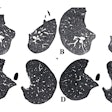Colon cancer is generally considered a gender-neutral disease, at least until the age of 50, when the risk for men begins to increase. Still, at diagnosis and staging, women tend to have more advanced disease than men, according to researchers from Ohio. They took a closer look at whether gender truly affects of the distribution of colon cancer stage at diagnosis.
"There are few known biological reasons to explain a possible difference between male and females," wrote Dr. Scott Woods and colleagues from Bethesda Family Medicine Residency Program and Good Samaritan Hospital, both in Cincinnati. "Because the incidence of disease is similar in men and women, the distribution for each stage of colon cancer should be similar as well, unless other factors come into play," (Journal of Women's Health, July 2005, Vol. 14:6, pp. 502-506).
Those factors may include socioeconomics, environment, and behavior, they added. For this retrospective study, they looked at a cohort of 2,891 patients listed in the TriHealth Tumor Registry, which keeps statistics on colon cancer patients in the Cincinnati area (rectal cancer patients were not included). The authors collected data on gender (1,467 women, 1,424 men), age, cancer stage, smoking history, alcohol history, family history of colon cancer, marital status, insurance status, and race.
According to the results, women with colon cancer were significantly older, more likely to be single or widowed, African-American, and on state health insurance. The women also showed significantly more regional disease (stage 2) than men. In addition, the women were significantly less likely to have a good prognostic stage, and were more likely to have a poor prognostic stage in comparison to men.
Meanwhile, males were more likely to have carcinoma in situ (stage 1), a history of tobacco use, and regular consumption of alcohol. There were no differences between the genders for family history or stage 3 (local disease) and stage 4 (distant disease).
"We found that men were more likely to be diagnosed with colon cancer at an earlier stage, especially (carcinoma in situ), leading to a better prognosis," the authors stated.
One main reason for this is that men are more likely to be screened for colon cancer, using current screening guidelines -- an annual fecal occult blood tests, flexible sigmoidoscopy every five years, or colonoscopy every 10 years. A barrier that may prevent women from undergoing colon cancer screening is exclusive visits to a gynecologist (versus a general practitioner) with an emphasis placed on screening for breast and cervical cancer, the authors explained.
Woods' group acknowledged that a limitation to their study was that it was regional with the patients reflecting local ethnic populations. They said that a second study looking at colon cancer stage trends in the state of Ohio is under way. Another issue that must be addressed in future research is the factors that contribute to late detection and diagnosis in women.
By Shalmali Pal
AuntMinnie.com staff writer
September 27, 2005
Related Reading
Beer and spirits boost colorectal tumor risk, September 20, 2005
High vitamin B6 intake may reduce colon cancer risk in women, June 13, 2005
Flexible sigmoidoscopy often misses advanced colorectal neoplasia in women, May 19, 2005
Men more likely than women to accept bowel cancer screening, February 25, 2005
'Katie Couric effect' raises colon screening rates, July 14, 2003
Copyright © 2005 AuntMinnie.com




















